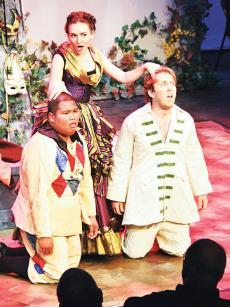PCC’s Sexson Auditorium was reverberating on Sunday with echoes of the powerful, periodically comical and melodic performance: “4 One Act Operas”.The singers kept the audience captivated throughout the performance with humor coupled with powerfully clear voices that blended harmoniously when converged with one another. Sponsored by the Performing and Communication Arts Division, “4 One Act Operas” was directed by Anne Marie Ketchum, director of the PCC Opera Program and vocal performance techniques teacher.
While introducing the performance, Ketchum told the audience: “Most of the time we think of operas as being lengthy. That is not the case here today.”
Each of the four operas lacked lengthiness indeed. While some operas last over five hours, “4 One Act Operas” was about two hours, from 3 p.m. to 5 p.m. There were also performances of this opera on June 4 and 5, some of them with different singers.
Before the show, Ketchum gave a short synopsis of each opera. She also explained that the Venetian Carnivale masks were continual props for the operas because of their relevance to each theme.
The show began with “A Hand of Bridge,” a very short opera written by the American composer Samuel Barber. In the performance four people sat at a table playing the card game bridge. As each person sang, he or she expressed personal thoughts that occurred throughout the card game. Though at times the clashing thoughts intertwined with one another, every convergence of voices between singers was harmonious.
“The Telephone (or L’amour a trois)” came second and was longer than the first opera. This performance generated laughter by the audience because of its comical nature.
In this opera written by Gian-Carlo Menotti, the character Ben, performed by Nathaniel Rausch, keeps trying to ask something important of Lucy, performed by Roksana Zeinapur. Lucy, however, will not get off the telephone and every time Ben tries to ask the question Lucy is interrupted by the ringing of the phone. As the lack of communication rises tensely, the more humorous the situation becomes.
During intermission, music major Alex Soto said, “I’m not an opera kind of person, but watching this has made me want to change that and start watching more operas. It has opened up my mind to the beauty of the music and how there can be a comical side to it.”
“Little Harlequinade,” written by Antonio Salieri was also greeted by much laughter from the audience. The tug-of-war between Harlequin, performed by Jordan Dugay, and Brighella, performed by Mike Davis, over the heart of Columbine, performed by Roksana Zeinapur, evolved into a comical conclusion that induced chuckles from the audience. At the end of the opera the three singer’s voices blended together intensely.
“This opera was a lot of hard work, “said Mike Davis who sang in “The Telephone and Signor Deluso.”
“I had four very quick changes so I was running around and almost missed a few entrances. But this was a fantastic experience,” said Davis
The fourth opera involved the most singers. “Signor Deluso,” written by Thomas Pasatieri was a jocular drama involving a plethora of miscommunications between characters. The more messy the situation became, the more hilarity that ensued.
At the end of the opera, once all of the drama is resolved, five strong voices fused together and concluded with the theme of the opera: “Don’t always believe what you see.”
Elizabeth Queen who played Celie in “Signor Deluso” said, “I loved the experience of doing this opera. I really developed with this workshop and I feel like my voice has grown a lot.”
Each of the voices in these operas was strong and well developed as they resonated loudly in the auditorium.

The “Opera Scenes” directed by Anne Marie Ketchum, was full of intense opera singing and laughter. In the scene “The Little Harlequinade” the female actor turns the heads of both male actors which is an act of humiliation. (Michael Barron Del-Cid)
- EDITORIAL: Apologize about the real problem - April 23, 2014
- STATEMENT: District apologizes to Oscar winning alum - April 21, 2014
- EDITORIAL: The Forgotten Students - March 26, 2014
